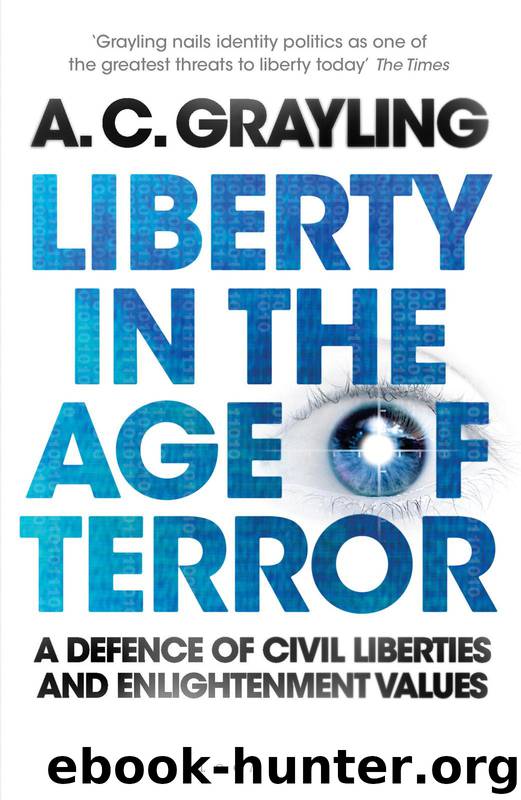Liberty in the Age of Terror by A. C. Grayling

Author:A. C. Grayling
Language: eng
Format: mobi, epub
Tags: Hewer Text UK Ltd http://www.hewertext.com
Publisher: Bloomsbury Publishing
Published: 2010-05-01T04:30:00+00:00
No fewer than six consecutive articles of the UDHR – 6 to 11 – concern themselves with law. They constitute the single largest grouping in the entire document. Why so many? Giving an answer involves pulling up some deep roots.
For much of the last eight centuries England (specifically England) was regarded as a model for the rest of the world because of the liberties enjoyed by its citizens, offering a sharp contrast to autocratic regimes everywhere from Versailles to Kyoto. In the eighteenth century Voltaire attributed English liberty to the constitution of the people rather than to the constitution of the state; English individualism and independent-mindedness, he implied, were the bulwark of their liberty rather as their navy was the bulwark of their land.
But there was in fact a constitutional provision that underlay the Englishman’s vaunted liberty: the provision in Magna Carta – the only one that directly concerned everyone in society irrespective of rank or occupation – that said, ‘No freeman is to be taken or imprisoned or destroyed except by the lawful judgment of his peers, or by the law of the land. To no one will we sell, to none will we deny or delay, right or justice.’
Some think that this provision is the origin of habeas corpus, which requires anyone who restrains the liberty of another to bring that person to court and there show good reason why he is restrained. If the court is not satisfied with the explanation, it is obliged to order his release. Others say that Magna Carta simply confirms what had long been part of Anglo-Saxon common law.
Either way, the larger idea implicit here is that of ‘due process of law’ – compare the Fifth Amendment of the US Bill of Rights, which guarantees that ‘no person shall be deprived of life, liberty or property without due process of law’. Due process is a safeguard against arbitrary interference with an individual’s rights; the idea of rights is practically meaningless in any dispensation where no such safeguard exists.
And that is why such a large chunk of the UDHR is devoted to the vital question of law. The articles assert everyone’s right to be treated as a person before the law, equally with all other persons. They state that everyone is to have access to effective remedy for violation of his rights, freedom from arbitrary arrest, and a fair trial – which means trial before an impartial tribunal, a presumption of innocence, and an adequate opportunity to prepare a defence.
The second paragraph of Article 11 says that no one shall be held guilty of doing something that did not constitute a crime at the time he did it; this enshrines a principle of natural justice that was consciously if not uncontroversially set aside in the Nuremberg Principles under which the Nazi war criminals were tried. The Principles defined ‘crimes against peace’, ‘war crimes’ and ‘crimes against humanity’, and were claimed by critics to create a set of ‘ex post facto’ (‘after the event’) offences which no law forbade at the time they were committed.
Download
Liberty in the Age of Terror by A. C. Grayling.epub
This site does not store any files on its server. We only index and link to content provided by other sites. Please contact the content providers to delete copyright contents if any and email us, we'll remove relevant links or contents immediately.
The Thirst by Nesbo Jo(5791)
Permanent Record by Edward Snowden(5004)
The Myth of the Strong Leader by Archie Brown(4795)
Spare by Prince Harry The Duke of Sussex(4213)
A Higher Loyalty: Truth, Lies, and Leadership by James Comey(4038)
Secrecy World by Jake Bernstein(3787)
Adulting by Kelly Williams Brown(3678)
The Borden Murders by Sarah Miller(3592)
Fear by Bob Woodward(3261)
Killers of the Flower Moon by David Grann(3252)
The Last Girl by Nadia Murad(3057)
The Secret Barrister by The Secret Barrister(3010)
Future Crimes by Marc Goodman(3005)
American Kingpin by Nick Bilton(2977)
Liar's Poker by Michael Lewis(2816)
The House on Mango Street by Sandra Cisneros(2778)
Graduate Admissions Essays, Fourth Edition: Write Your Way into the Graduate School of Your Choice (Graduate Admissions Essays: Write Your Way Into the) by Asher Donald(2478)
Delicious Torment by Linsey Lanier(2449)
Camino Island by John Grisham(2388)
